Hello everybody,
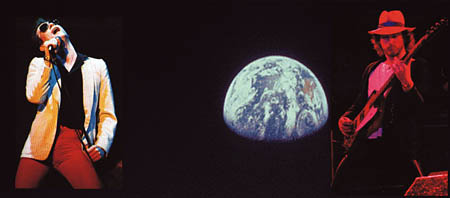 Friday night 4 July 1980, 8 o'clock in the evening. Finally we know a new "OVER THE RAINBOW EN ZO" will be released.
Friday night 4 July 1980, 8 o'clock in the evening. Finally we know a new "OVER THE RAINBOW EN ZO" will be released.
Right away after the Rainbow concerts in February we started with this issue. The planning was to get this issue out at the end of February. But difficulties
with the printing made it heavily delayed.
Still we got so many articles we know let out a double issue, and still we had to leave out some articles. Like an interview by the old fanclub leaders Bart Hekkelman and Rene Veldhoen in Rotterdam with Don Airey. These will be in the next issue.
STOP - STOP - STOP - STOP - STOP - STOP - STOP - STOP - STOP - STOP - STOP - STOP
NEW RAINBOW ALBUM
Just before this issue was printed we got news about a new Rainbow album
After the European tour left for the Far East and did in May in Japan several shows which were record for release of a live album. On this album we'll get at least the track "WILL YOU STILL LOVE ME TOMORROW" (this was also played in Brussels), it's an old song that also is on Bonnets first solo-album. This song will also be released as a single. The live album is likely to get released just after the summer, most likely in September. After the Japanese tour the band went back to the studio for the next studio album, which might be released early 1981.
3 DAYS RAINBOW
REPORT ON 3 DAYS DRIVING, SURPRISES, INTERVIEWS, HARDLY ANY SLEEP AND MUSIC
Friday 1st of Februari 1980 13.00 hours. From the Wilhiminastraat in Rijssen (Holland) a Ford Capri leaves, it will have to drive 1300 km this weekend. The driver, Wim, first goes to Ossendrecht where he'll pick me up. After a long drive we finally reach the destination, the Forest National in Brussels. First we have to find Marc Brans (chairman of the belgian Deep Purple fanclub), as he promised to get us the tickets. He even arranged a backstage pass. There's not much going on yet. Roadies are still busy with putting the equipment on the stage. First thing we noticed is the rainbow is no longer part of the stageshow. We heard the stories about it, but we had to see it to believe it. The support-act is Catchese, they're from Manchester. This group looks a bit unsure, they're not bad but they lack an own style. And then it's waiting for Rainbow. It feels like it's taking ages.
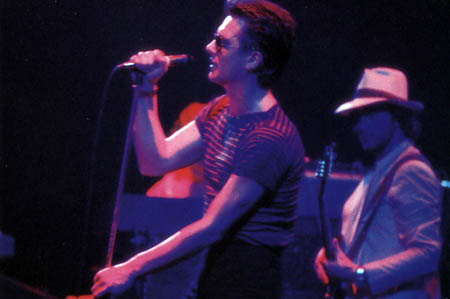 Then finally from the speakers we hear the "Pump and Circumstance March" by Elgar. Followed by "Land of hope and glory" and the lights go out, the crowd's going wild and Judy Garland tells us we're not in Kansas anymore but over the rainbow, rainbow, rainbow... There's not the expected bashing from the "On Stage" show, and very surprising we hear synthesizers starting the intro of "Eyes of the world". The lights go on, an explosion, smoke on the stage and we see Don, Roger, Cozy, Graham and Ritchie (ofcourse dressed in black).RAINBOW 1980 has started!!!!
Then finally from the speakers we hear the "Pump and Circumstance March" by Elgar. Followed by "Land of hope and glory" and the lights go out, the crowd's going wild and Judy Garland tells us we're not in Kansas anymore but over the rainbow, rainbow, rainbow... There's not the expected bashing from the "On Stage" show, and very surprising we hear synthesizers starting the intro of "Eyes of the world". The lights go on, an explosion, smoke on the stage and we see Don, Roger, Cozy, Graham and Ritchie (ofcourse dressed in black).RAINBOW 1980 has started!!!!
I'm myself between the photographers, just in front of Ritchie. He plays very relaxed and makes a couple of mistakes in "Eyes of the world". Graham surprises me right from the start. The backdrop of "Down to earth" looks excellent and it make you feel like you're in the Rainbow Spaceship. I saw Roger the last time at the legendarily RAI concert with Deep Purple in Januari 1973. He hasn't changed a bit, only 7 years older. Graham looks like a new born James Dean. He's a gentleman, very kind to the audience, he isn't also not that young. "Love's no friend" is the second song.
Live it's obvious that this song is a replacement for "Mistreated". Ritchie misses again a tempo-change and looks a bit pissed. There a loud cheer from the audience in Brussels as the band plays "Since you been gone". I only notice at this moment Roger's singing the backing vocals. The song is not completely finished as Ritchie starts all of a sudden "All night long". In the second part Ritchie plays a great slide-solo on the melody of "Over the rainbow". Graham announce then: "Here's an old song. I think you know the words better than I do. So will you please help me out?"
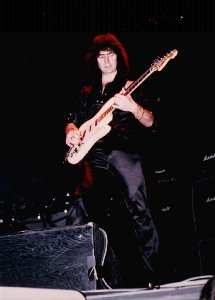 Ritchie built up the tension. The crowd's quiet when he plays easily some classical pieces. Cheering follows as he plays "Greensleeves" (written by Henry VIII). But then there's finally "Catch the rainbow", for me one of the best songs in the whole history of pop music. Graham makes me forget that Ronnie Dio once sang this song. Ritchie starts to get in the right mood.
Ritchie built up the tension. The crowd's quiet when he plays easily some classical pieces. Cheering follows as he plays "Greensleeves" (written by Henry VIII). But then there's finally "Catch the rainbow", for me one of the best songs in the whole history of pop music. Graham makes me forget that Ronnie Dio once sang this song. Ritchie starts to get in the right mood.
It looks like he's really enjoying himself. It's 45 minutes after the start of the show when Don, which we haven't noticed that much so far, does the intro for "Lost in Hollywood". Just like Ritchie Don plays a couple of classical pieces. Via Cozy the song really get started. The song goes in the same arrangement as "Still I'm sad" in the old days. Ritchie and Don play an excellent duet, including "Alle Menschen werden Brüder" (also known as "Jesu joy of man's desire") from Beethoven's Ninth. Then it's Cozy's turn with his solo. This one is still the same. With the music of Tchaikovsky's "1812 Overture" is his drum solo something spectacular in the rock business. The light show is also excellent and the explosion that follows is frightening. After Cozy's solo the band continues with "Lost in Hollywood". Ritchie plays again another brilliant solo. It's the theme from "A light in the black". The group is already 90 minutes on stage as Graham says goodbye and leaves the stage, leaving 5000 fans in the dark.
Ofcourse everyone wants more. Forest National goes berserk and everyone sounds "We want more". "Man on the silver mountain" is the first part of the encore, followed by the Blues. Then Bonnet announces "The next song is a special thank you from Rainbow to you. Do you love Rainbow tomorrow?" Again 5000 times yeah. "Will you love Rainbow tomorrow?" Again 5000 times yeah.
And then the surprise of the evening: a song from Graham's first solo album from 1977 ("GRAHAM BONNET" - Mercury 9199 133 - Phonogram) called "Will you still love me tomorrow", written by Carole King. It's a great ballad, which excellent fits in with the blues. And a great way to end the show (well, it's what I thought that moment)
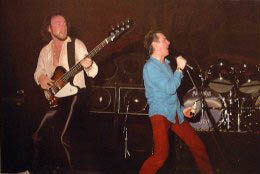 The audience however doesn't want to let Rainbow go. And again the group returns. Ritchie has changed his expensive Fender for a cheap imitation model, you only can see that if you're close to the stage. Blackie starts to make a lotta noise, Don, Cozy and Roger join the stage and they start a instrumental version of "Kill the King".
The audience however doesn't want to let Rainbow go. And again the group returns. Ritchie has changed his expensive Fender for a cheap imitation model, you only can see that if you're close to the stage. Blackie starts to make a lotta noise, Don, Cozy and Roger join the stage and they start a instrumental version of "Kill the King".
Ritchie picks up a bottle of booze and splash it out, after taking a sip, over the heads of the photographers (including mine). With his left hand he plays a real bottleneck solo and then throws the bottle away. Now it's time for the known act, Ritchie throws the guitar in the air, does some other tricks with it and then climb on the speakers and smashes it into pieces. This way everyone in the hall can see what's going on.
If the job's done, Ritchie returns on stage with his expensive Stratocaster and plays on. It's still not enough, Graham joins the rest also and we get "Long live rock'n'roll".
The crowd goes wild, everybody sing along. And even after the five members leave the stage the public wants even more. More, more, more. And Rainbow get back again. Again they play "Long live rock'n'roll" (Roger told later that they didn't rehearsed any other songs). Ritchie climbs again the P.A and I think he's going to smash another one. He tries to hang it in the lights but it fails, the Fender falls down but a roadie is fast enough to catch it. We all shout once more "Long live rock'n'roll" and then the shows is really over. The tape with "Somewhere over the rainbow" starts and checking my watch it become clear that the show took more than two hours. I'll try to find Marc and Wim, we check the backstage area and just see Ritchie leaving the showers.
Once outside we make an appointment to see each other back in the Hilton hotel, where Marc has arranged an interview with Roger. As we can't find the hotel we decide to leave the car, take a cab and find out Marc already started talking to Roger.
INTERVIEW ROGER
Wim and I join after Marc introduce us to Roger, immediately Roger gets us a beer (Thanks Roger).
(Marc recorded his interview and here's his story)
- I = interviewer R = Roger
- I: How come Ritchie asked you to write material for this album?
R: He asked me about 3 years ago to write material with him and Ronnie. I accepted, but we didn't do it in the end. Then the band splitted up, and he asked me again, cause Ritchie is excellent with music, but lyrics is something different. And as Graham didn't have any plans to write, I just did it. And as there wasn't a bassplayer, they asked me as well for the album. It took about 3 weeks to get used to the instrument again. It was obvious they asked me to join the group live as well after this.
- I: It's likely you stay with Rainbow, but on the promo photo of the record company we only see Ritchie and Cozy, which will give reasons for new rumors.
R: That was a mistake at the record company, it just was a rush job what went wrong. Just don't take too much notice of rumors the press always writes down.
- I: I was surprised you joined Rainbow, after you left in '73 Purple which Ritchie had a hand in?
R: When Ian Gillan and I left Purple, it was not like we were at once enemies with the others. By the way Ritchie and I wrote most part of the songs in Purple. Nobody was the leader in Purple. Rainbow is Ritchie's group and if you don't like that you better leave. I am creative but not a leader type. My job as a producer is to lead and give advice when the songs are rough and not ready yet, like some chorus here, a bit of violins there, etc. In case Ritchie has another opinion I have to go along with that as he's the leader.
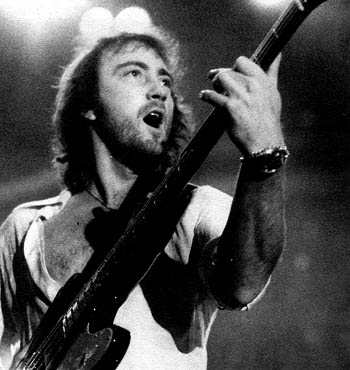 - I: Do you believe Deep Purple will ever re-unite, even tho it's only for a benefit show?
- I: Do you believe Deep Purple will ever re-unite, even tho it's only for a benefit show?
R: It always can happen and I think I would like it, but you should leave Purple in peace, the past is dead. Purple was big and we probably can't feed the high expectations. Even tho I know we could make a lot of money out of it I could give as an excuse that we should satisfy the fans, which isn't a lie at all.
- I: Do you still have contact with Ian Gillan?
R: Yes, two weeks ago I phoned him. It was a long conversation. He'll come and see us when we play Wembley and as surprise we'll get him on stage to sing with us on stage. (Note: this hasn't happened, read the articles later on about the Wembley concert).
- I: Why did you only produced one album for Ian?
R: He wanted to do an album, not a solo album but a group album. He asked me to produce that record and get some musicians together. I did it and when he started recording "Clear Air Turbulence" he asked me again as producer. But I thought the material was very weak for Ian, I thought he should get rid of the jazzy side. Ian was not satisfied about that and took another producer.
- I: Hie's doing now something totally different. If he'ld ask you now, would you do it?
R: I think he's back in the right direction..... and yes, I think I'll do it.
- I: Who's ideas were "Child in time" and "Smoke on the water"?
R: With "Child in time" is was Ian Gillan and Ritchie, with "Smoke..." it was me and Ritchie. I had a dream, woke up and spoke without reason "Smoke on the water". I think it was usable for a song, but couldn't come up with a melody. Then a few days later Ritchie came up with the famous riff. I told Ritchie about my dream and went to Ian who thought he could something with it. The rest is history.
- I: That fire in Montreux must have been a weird experience.
R: Yeah, it was unbelievable. We were in the hall when all of a sudden Frank Zappa and his Mothers left the stage and the audience calmly left the hall. Only I had the keys of the car so as the others didn't turn up I went back inside. I stood still for a few moments in front of the stage and saw Zappa's gear went up in flames. Because no one else was inside I went out again and about five minutes later everything was in flames.
- I: You also played on the "Wizard's Convention"-album. Did you have much contact with your former colleagues?
R: I played bass on just one track and that was when nobody else was there. That record was for Hardin the new Butterfly Hall. Do you know that film never made it?
- I: Do you think there are similarities between your "Elements" and Lord's "Sarabande"?
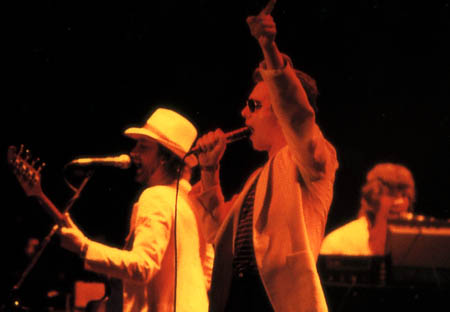 R: the only similarity is they were recorded about the same period and both used an orchestra. That's all. "Elements" was recorded in to weeks, but the release took another two years because of difficulties with the record company. It's a record without concessions to the public. I followed my own ideas at that moment. Ronnie Dio offered to sing on it if I wanted him to, but I preferred a fully instrumental record.
R: the only similarity is they were recorded about the same period and both used an orchestra. That's all. "Elements" was recorded in to weeks, but the release took another two years because of difficulties with the record company. It's a record without concessions to the public. I followed my own ideas at that moment. Ronnie Dio offered to sing on it if I wanted him to, but I preferred a fully instrumental record.
- I: You already released two solo albums, any more plans?
R: No plans yet, in tensions though, but on the moment I'm too busy with Rainbow. If you would ask me what to expect on a next solo album, I have to pass. It might be a bit more commercial but it'll depend of my state of mind at the moment I start recording.
- I: You went to Africa to learn more about percussion. Did you learn a lot?
R: No, not at all. I went there because percussion instruments have their origin in Africa. I travelled to Kenia and it turned out in that country there's no eye for music. I should have gone to Cameroon. Now it was a quiet holiday for me.
- I: On the cover of Cozy's "Over The Top" we see, "Thanks to Roger Glover". What was your part?
R: Cozy asked me to play bass on one track, which I did. In the end that particular track didn't fit with the rest so didn't made it to the album. Cozy was prepared to pay me for it but I said: "Forget it, I just did you a favor". Max Middleton also played on that song. And Cozy answered "OK, I'll thank you".
- I: I don't know if you're married, but isn't it difficult to have a family life as musician?
R: I'm married and have a 3 years old daughter, Gillian. I only regret it I don't see her that much. If you're a musician you're often away from home. But I earn pretty good which made up a bit for it.
- I: If you're in front of a going wild crowd, what does that mean to you now and in the past?
R: When I was in Purple I thought it were my fans and got carried away of it. You was standing on stage and it was like "hear am I, and I'll show you all how good I am". Now I know the fans are not here for me but to enjoy the music. I play their music and don't think I'm nothing more important than any fan.
- I: Is there a lot of difference in the musicbizz now compared to when you were in Purple?
R: I don't know much about it. Nowadays it's more business. When we were in Purple we just played what we wanted, we didn't intend to be commercial successfully a bit. Deep Purple never should have recorded a song like "Since you been gone". Nowadays people more choose for disco, punk and new wave. We have to try with more commercial things to get people in the halls and conquer our position back. That's why our European tour late '79 was delayed. In the States everything went fine, considering we're over there not so popular as here in Europe. After touring as support-act for Blue Oyster Cult we did concerts as headliner.
- I: How about the concert this night?
R: It went great, better than expected. Belgium has an audience that's not too enthusiastic, so we're not too keen to play here. Also the streets are very dangerous over here, driving a car here is a very dangerous thing to do. The hotels are not that good, but the show tonight was brilliant. Normally we don't do that many encores. In the end we didn't know what to play more, so we did another version of "Long Live...". Don't take the critisism on Belgium personal by the way.
- I: What are the plans after the English tour?
R: We first go to Japan and then start working on a new album. It's possible that one will have "Weiss Heim", the b-side of "All night long" (-not in Holland, Roger-), on it. "Bad Girls" is not going to be on it. I think that one should have been on "Down to earth" instead of one of the others. "Weiss Heim" is an instrumental, written by Ritchie.
- I: If you ever quit Rainbow, are you going on with live performances or do you get back to the life of producing records only?
R: I don't know. It's likely I'll always do something with music, but who can tell me if I'm gone deaf in ten years? Maybe then I'll put more time in painting, another hobby of mine. I never sold any painting so far, but maybe in the future that will happen some day. My style? I should say impressionism although I also do landscapes and seagulls which I like a lot. I hope my daughter won't start a music group but joins the ballet or something.
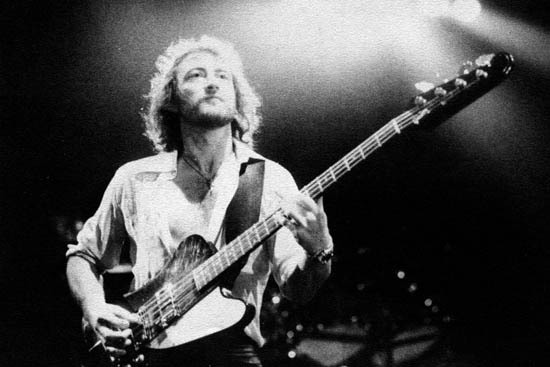 - I: I heard Glenn Hughes was recently saved from drugs.
- I: I heard Glenn Hughes was recently saved from drugs.
R: I don't know if you can call it 'saved'. He tried to get himself in many groups in the States, but he got fired over and over again because of his Stevie Wonder-complex and his difficult attitude.
On that moment Marc ends his interview with Roger. He picks up his recorder and camera and leaves the Hilton, going back to Diest.
Wim and I stay for another while, talking with Roger, while Ritchie behind us sits talking at another table
- We: Roger, just like many Rainbow-fans we were very surprised that Ronnie left the group.
R: I can imagine that. By the way, if you want to have the full story you have to ask Ronnie himself about it. I can't tell you why he's no longer in the band.
- We: What's Ronnie doing now?
R: He's busy with the guys in Black Sabbath. He first was supposed to sing on the one record only, but it looks like he stays in the band after all. It seems there are two black sabbaths now.
- We: ???.
R : The first one is the old one, but now with Ronnie as the singer. The other is the new group with Ozzy Osbourne. That also features my Rainbow-predecessor Bob Daisley.
- We: That left us with David Stone. What's happened to him?
R : I don't know, but it sure he went back to Canada.
- We: "Down to earth" was made under strange circumstances we heard.
R: Yes, Ritchie, Cozy and I recorded the basic tracks, that was pretty difficult because we didn't have a singer. We had a load of people who did an audition. Some where well known names who were very keen on the job. I won't tell you their names, but you would be surprised who we turned down. Graham came out of nowhere. I'm curious how the European fans will react because he's totally different both as a singer and as person than Ronnie.
- We: After you left Purple did you tried to get back on stage?
R: I tried to start a group with a couple of friends but we didn't came any further than experiments in the studio. I always wanted to play live because that's the best about it all.
- We: It's now the night of 1 to 2 February. Tomorrow you're going to Holland. It is 7 years and a few days ago the last time you was in Holland. Do you still remember what happened then?
R : Unfortunately, yes. I always wanted to forget what happened that night. I still think it was horrible and I hope it won't happen ever again. The sad thing was the fans were the victims caused by many factors. It's was the nadir of my career. the problem with Purple was that everyone wanted to be the boss and that was just not possible. That's why things went wrong. Ritchie didn't noticed that danger in time, but it won't harm him again. Rainbow is Ritchie's group and, like I told your belgian colleague before you came in, if you're having a different opinion then you can go. But to get back to your question I'll be making up for it tomorrow in Rotterdam. Tell it your friends.
This is a good moment to end the interview. I show Roger copies of the first two fanclub magazines. Roger looks very interested. He's very positive about it, especially about the drawing of Ritchie. He pops over to Ritchie and shows him the drawing. Ritchie starts reading the magazine himself now. After a short while, we'll give a careful try. We walk to the table where Ritchie and Roger are sitting.
AND THEN, AFTER YEARS OF WAITING
TALKING WITH THE MASTER
- I: Ritchie, do you like the drawing?
R: Yes, I think it's well done. Who did it?
- I: An old schoolfriend of mine.
R: He's very good. Is he professional? I would like to get one on a big format (point with his hands to the size of a LP cover) and I'm willing to pay for it.
Ritchie reads again in the fanclub magazine, just like we're not present. He watches the first part of the interview "THE MAN IN (THE) BLACK" from the last magazine. But it's in the Dutch language and I can't imagine he'll understand it.
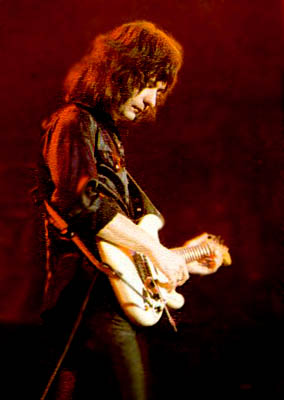 - I: Can you read it?
- I: Can you read it?
R: No, but I pick up a few things. I can remember this interview very well. Can you get me a translation.
- I: That's not necessary. I got the original.
I open my suitcase and hands over the original to Ritchie.
R: Just wait a minute. I want to read this. I hardly get a chance to read something about myself. I talk a bit more to you guys later.
Ritchie starts reading the interview in a corner of the bar, the interview on his lap. there we are. The bar is getting more empty. Don Airey was a short time present, but is gone again. Cozy Powell was there, but has also left already. We didn't see Graham here. Roger still is in the bar with a few roadies. Then after a while a waiter tells that "the bar is closed", and Roger answers "OK we'll go on in the dark".
Laughs all over the place, but the waiter isn't amused. He's an old geezer who can't understand that long haired blokes in jeans and leather trousers dare to stay in the Hilton hotel. They must have a lot of money to stay here. Then there's the solution: "You can use the room service and have a drink up there."
Everyone thinks that's alright and they all leave the bar. Also Ritchie stands up and joins us telling he want to finish reading the interview and asks us to join him in the corridor. There's enough room to sit down. Ritchie continues reading the interview quietly. We do not disturb him. And then a few minutes later he's finished.
R : This is really a good interview. This is the first time in my life I read what I told a reporter. I have to admit I'm not reading that much about myself, because there's no time for it. But I know often my words are printed down a bit twisted so the readers get the wrong impression about me. I'll give you an example. I once told "I don't like this hotel". Then they only print that on black and white, nothing else while I also said "I like the people, the food is excellent, the room service is alright, but I don't like the hotel" so I mean I only didn't like the building style and maybe the furniture in the rooms. It's only an example and I can name a lot more but it only get you bored. Anyway this story by Sylvie Simmons is really an exception. It tells exactly what I told her. I like to get a copy of this interview. Can you arrange that?
- I: I can make you a photocopy and send it you, if you give me an address where I can send it to.
R: You can send it to the management office, but I only get there once a year and then there's at least a huge pile of post and that once gets right away in the dustbin. I'll give you my private address but you have to promise you won't print it in your magazine.
Ritchie then writes on a piece of paper his private address (somewhere in the States) and his phone number.
- I: Then I realize that Rainbow will play Rotterdam tomorrow. I can try and make a photocopy tomorrow afternoon. I can give you it then after the show. Can we arrange that?
R: That's also alright. Get to the Hilton in Rotterdam tomorrow, I'll be there.
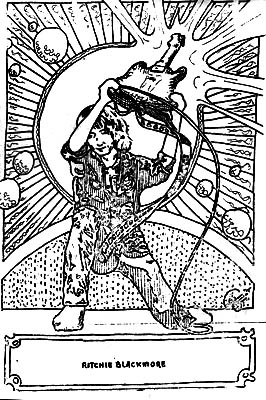 - I: Ritchie, we know all about your reputation. Your attitude against the press is wellknown. How is it possible the press is always very negative about heavy metal?
- I: Ritchie, we know all about your reputation. Your attitude against the press is wellknown. How is it possible the press is always very negative about heavy metal?
R: I don't know...or I do know. The press is since ages very negative about our music. Wait another two weeks and read the English papers. Then we'll play overthere. I'll bet they already have written their reviews: too long songs, too many solos, bit too much of that, bit too less of this. They always write the same but often don't know what I play. You know, I don't want to be predictable. I told it so many times, but I'm on the point that I'll do whatever I want. There's no journalist on this world who can stop me. I have played 8 years of my life in a group where nobody was the leader and it got a mess. Now I'm the boss and I tell what's happening. If you don't like it, well then it's not my problem. I work with a certain concept, but in between is room for changes, and they could be very subtle. And especially these changes never get noticed. How many times I have to hear that Rainbow is nothing else than fucking Purple. Purple never should showed up with something like "Catch the rainbow". But we were talking about the press. They are negative and I guess it'll stay like that forever. Still I've to met the first people who can tell me why hard-rock concerts are so often sold out despite of the negative publicity.
- I: Is Rainbow, especially the show not too much built on old gimmicks?
R: Rainbow is a rockband that should amuse the audience as well bring good music. Maybe I prevented that Rainbow became a showband.
- I: You mean the rainbow in front of the stage was distracting too much from where it's all about, the music itself?
R: Exactly. Besides it was too expensive. For me the music will always be in the first place, but you need a certain amount of entertainment otherwise you better can put some robots on the stage.
I show Ritchie the first fanclan magazine, with the cartoon of Robbie Rockfanaat. Robbie goes to a Rainbow-concert, says on a certain moment "Blackmore is the king of rock and roll", and gets Ritchie's smashed guitar on his head and then says: Kill the king.
R : Is that typical Dutch humor?
- I: No. this is exactly what happened at the first Rainbow-show in Holland in 1976.
R: I don't do this anymore, throwing a smashed guitar in the audience. Too many people got hurt and got into hospital. It's too dangerous. Besides people start fighting for a small sliver. I guess you've seen the last show, and you could see things are now different. In the early days I smashed the guitar on the stage and people who were more than 5 meters away couldn't see a thing of it. Nowadays I climb on top of the P.A. and everybody can see what's going on. And the leftovers I hang up high in the lights. I only have to watch my condition, because I have to climb the speakers very often, ha ha ha.
That moment Eric Thompson gets inside. Eric is the European tourpromotor of Rainbow. I don't know what exactly is Eric's job, but he has to take care off concert-announcements in cities where Rainbow will play. In the Rainbow household he is not a stranger. He's often the subject of a practical joke. He's from Denmark and his English is not that good. On the last tour in Europe he got very drunk. That was autumn 1977. During the show in Paris Palais de Sport they hang him up under the rainbow with a rope around his waist only dressed in a t-shirt. The next morning he couldn't remember what happened.
Alright. Eric Thompson walks panicky into the Hilton.
Eric: Your and Graham's stage clothes are stolen.
Ritchie: Oh, that's a pity for you. I'll have to perform in your clothes tomorrow then.
(giving us a wink).
Eric: But, Ritchie. It's serious, it's true. The clothes have gone.
Ritchie: Eric, you are drunk (grin on his face).
Eric: Oh no Ritchie, you cannot say that.
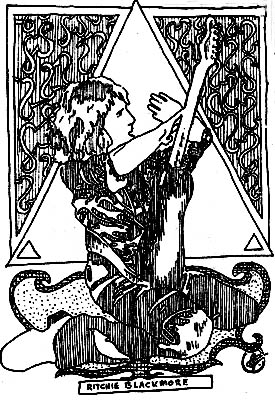 It goes on for a while like this. Eric sits down to Ritchie with his attache case. Blackmore is having fun, as he fools with Eric over and over again.
It goes on for a while like this. Eric sits down to Ritchie with his attache case. Blackmore is having fun, as he fools with Eric over and over again.
There's a long discussion about the number of people who've been at the show tonight in Forest National in Brussels. Ritchie picks up Eric's hand, looks him deeply in the eye, like he's trying to hypnotize him. Eric has to tell in perfect English language how many people tonight visited the show, how many security guards, how many back stage passes, etc. It takes Eric countless attempts.
Then there's a business conversations between both of them. Eric asks Ritchie if he can tell everything while he's pointing at us. Ritchie answers: "They're OK, I trust them". Eric then opens his attache case. There's a lot of papers in it. I can't follow everything because they both start talkin' muffled. It seems there were several problems in France. A live broadcast for French radio of a gig is the subject. Eric thinks there are too many risks, but Ritchie says it's no problem. Also the cities where the shows will be is a discussion subject. Ritchie prefer to play in the wintersport places. He don't wanna play in Grenoble but wanna do Lyon. I can't understand why. Anyway both gentlemen don't come to an agreement this night.
- I: Ritchie, why don't you like France?
R: France is a difficult country for us. A live concert on radio is a good way to get more attention. We just want to make same money there. People are very down overthere. They sit in their chairs and hardly react. Germany is totally different. I like the people overthere, except for the fascist concert promotors, they try to con you always. Once we played Essen and I knew there were at least 7000 people, but one way or the other that fucking cunt got on paper there were only 4500. We got really screwed up. These days that won't happen again, cause now we have one tourpromotor, that's our Eric overhere, he arranges everything now.
Eric then starts something else. From his attache case he gets a packet of photographs. They're holiday snaps of Cozy Powell and Jeff Beck. Ritchie look at them with not much of a interest
Eric: Well Ritchie, how about these?
Ritchie: Well Eric, the photographer knows his job. The choice of colours is near perfect. The background is chosen well. So these are very nice pics.
Eric: No Ritchie, seriously.
Ritchie: Alright Eric. I don't wanna say that much about it, but there are rumors and these get stronger. I can't tell right now but time will tell.
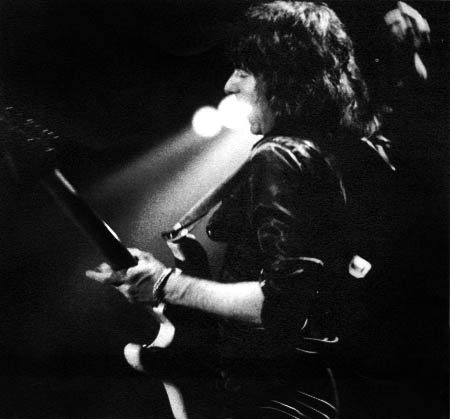 Then Eric put the photos back in his attache case and says goodbye to us and Ritchie. Then Ritchie takes our file book and starts reading in it. He says he didn't knew there has been written that much about Rainbow. The German articles attract his attention the most.
Then Eric put the photos back in his attache case and says goodbye to us and Ritchie. Then Ritchie takes our file book and starts reading in it. He says he didn't knew there has been written that much about Rainbow. The German articles attract his attention the most.
RB: I van read the German quiet well. I used to live in Germany some time and got twice married a German woman and divorced twice as well. I can read and understand the language quiet well. I just can speak it that good.
To prove it he takes an article from the BRAVO magazine and tells us in English what's it all about.
- I: Ritchie, do you get on with your ex-Purple colleagues?
RB: With most quiet good, still I don't meet them too often these days. I only do not get on with Coverdale. I don't know why. First time I met him, when he did his audition for Purple, he looked alright to me but if it was up to me I kicked him out three months later.
Ritchie, then tells us he wants to go to sleep, so we say goodbye and agree to meet again tomorrow after the gig in Ahoy in the Hilton hotel in Rotterdam the next day.
It's about 4 o'clock in the morning when we leave the Hilton and start heading for Rotterdam. Almost two hours later we arrive there. Time to start day two of RAINBOW IN DE BENELUX.
END PART 1 (Double issue Over The Rainbow en zo 3 & 4)
© Rainbow Fanclan 1979-1984
|


 Friday night 4 July 1980, 8 o'clock in the evening. Finally we know a new "OVER THE RAINBOW EN ZO" will be released.
Friday night 4 July 1980, 8 o'clock in the evening. Finally we know a new "OVER THE RAINBOW EN ZO" will be released.  Then finally from the speakers we hear the "Pump and Circumstance March" by Elgar. Followed by "Land of hope and glory" and the lights go out, the crowd's going wild and Judy Garland tells us we're not in Kansas anymore but over the rainbow, rainbow, rainbow... There's not the expected bashing from the "On Stage" show, and very surprising we hear synthesizers starting the intro of "Eyes of the world". The lights go on, an explosion, smoke on the stage and we see Don, Roger, Cozy, Graham and Ritchie (ofcourse dressed in black).RAINBOW 1980 has started!!!!
Then finally from the speakers we hear the "Pump and Circumstance March" by Elgar. Followed by "Land of hope and glory" and the lights go out, the crowd's going wild and Judy Garland tells us we're not in Kansas anymore but over the rainbow, rainbow, rainbow... There's not the expected bashing from the "On Stage" show, and very surprising we hear synthesizers starting the intro of "Eyes of the world". The lights go on, an explosion, smoke on the stage and we see Don, Roger, Cozy, Graham and Ritchie (ofcourse dressed in black).RAINBOW 1980 has started!!!! Ritchie built up the tension. The crowd's quiet when he plays easily some classical pieces. Cheering follows as he plays "Greensleeves" (written by Henry VIII). But then there's finally "Catch the rainbow", for me one of the best songs in the whole history of pop music. Graham makes me forget that Ronnie Dio once sang this song. Ritchie starts to get in the right mood.
Ritchie built up the tension. The crowd's quiet when he plays easily some classical pieces. Cheering follows as he plays "Greensleeves" (written by Henry VIII). But then there's finally "Catch the rainbow", for me one of the best songs in the whole history of pop music. Graham makes me forget that Ronnie Dio once sang this song. Ritchie starts to get in the right mood. The audience however doesn't want to let Rainbow go. And again the group returns. Ritchie has changed his expensive Fender for a cheap imitation model, you only can see that if you're close to the stage. Blackie starts to make a lotta noise, Don, Cozy and Roger join the stage and they start a instrumental version of "Kill the King".
The audience however doesn't want to let Rainbow go. And again the group returns. Ritchie has changed his expensive Fender for a cheap imitation model, you only can see that if you're close to the stage. Blackie starts to make a lotta noise, Don, Cozy and Roger join the stage and they start a instrumental version of "Kill the King". - I: Do you believe Deep Purple will ever re-unite, even tho it's only for a benefit show?
- I: Do you believe Deep Purple will ever re-unite, even tho it's only for a benefit show? R: the only similarity is they were recorded about the same period and both used an orchestra. That's all. "Elements" was recorded in to weeks, but the release took another two years because of difficulties with the record company. It's a record without concessions to the public. I followed my own ideas at that moment. Ronnie Dio offered to sing on it if I wanted him to, but I preferred a fully instrumental record.
R: the only similarity is they were recorded about the same period and both used an orchestra. That's all. "Elements" was recorded in to weeks, but the release took another two years because of difficulties with the record company. It's a record without concessions to the public. I followed my own ideas at that moment. Ronnie Dio offered to sing on it if I wanted him to, but I preferred a fully instrumental record.  - I: I heard Glenn Hughes was recently saved from drugs.
- I: I heard Glenn Hughes was recently saved from drugs. - I: Can you read it?
- I: Can you read it? - I: Ritchie, we know all about your reputation. Your attitude against the press is wellknown. How is it possible the press is always very negative about heavy metal?
- I: Ritchie, we know all about your reputation. Your attitude against the press is wellknown. How is it possible the press is always very negative about heavy metal? It goes on for a while like this. Eric sits down to Ritchie with his attache case. Blackmore is having fun, as he fools with Eric over and over again.
It goes on for a while like this. Eric sits down to Ritchie with his attache case. Blackmore is having fun, as he fools with Eric over and over again. Then Eric put the photos back in his attache case and says goodbye to us and Ritchie. Then Ritchie takes our file book and starts reading in it. He says he didn't knew there has been written that much about Rainbow. The German articles attract his attention the most.
Then Eric put the photos back in his attache case and says goodbye to us and Ritchie. Then Ritchie takes our file book and starts reading in it. He says he didn't knew there has been written that much about Rainbow. The German articles attract his attention the most.